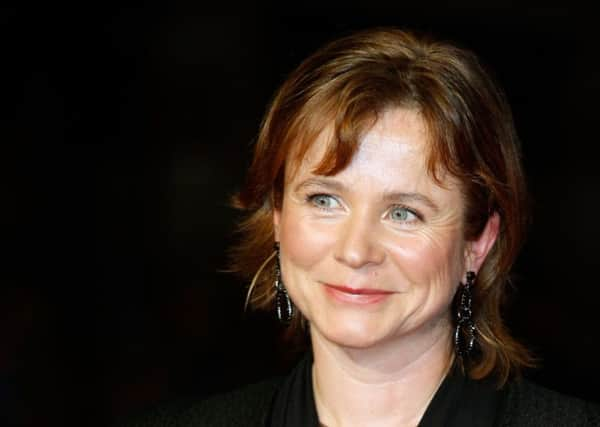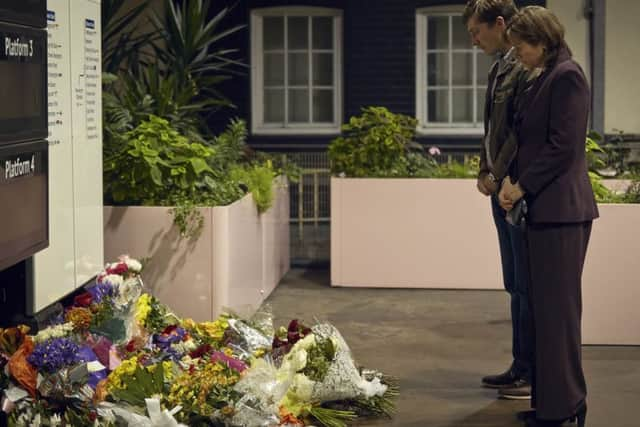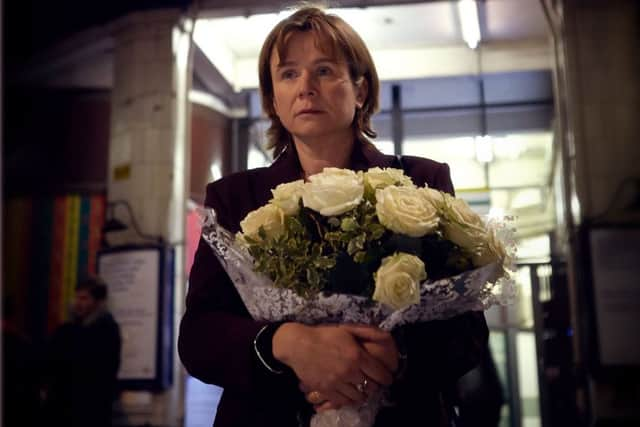Emily Watson on acting and family life


ON THE morning I was to speak to Emily Watson, the PR who had arranged the interview called me. She wanted me to know that Watson’s father had very recently died. I appreciated her decision to tell me and, although she didn’t know it, the news created a kind of odd symmetry, because the last time I had spoken to Watson it wasn’t very long after my own father had died.
On that occasion, I asked Watson a question about grief, related to the sudden loss of her mother as she shot the movie we were speaking about, but as I did so, my upset overcame me and I choked. It took me completely by surprise. Watson was lovely. She fetched me a glass of water and was kind. I recovered and we moved on.
Advertisement
Hide AdAdvertisement
Hide AdNow here we are again, with a different project to talk about – the moving A Song For Jenny – and grief, which is the main subject of this new drama, is here too.


With such a recent bereavement, not to say something about it, even just briefly passing on my condolences, would have felt wrong. As I’d expected, Watson was gracious. Her voice was quiet, a little tentative, but that’s just how she sounds. “I was just in the middle of a round table talking about some of the more emotional aspects of A Song For Jenny and suddenly it was like, ‘Oh shit, am I going to go?’ In a way what’s going on in real life has made me feel less intense about speaking about this today, because it’s been a very intense thing for me to do this drama. I found it profoundly affecting.”
Ours is Watson’s final interview of the day. She is the kind of actor who endures press duties rather than enjoys them. Perhaps I feel more accepting of her reticence because I’ve interviewed her before, so there’s no shock. I already know that what you get when you speak to Watson, in addition to extremely politely expressed reluctance, is someone who is both smart and succinct. For a twice Oscar-nominated actor with a reputation for searing performances in both film and on TV, she doesn’t do overblown, and there is literally not a trace of self-promotion. Compliments are batted away with, “you’re very kind”, or sometimes just an embarrassed little harrumph. Career decisions are explained by way of trusty old phrases such as, “I’ve been very lucky…” Maybe this is why Watson is so fascinating, such a puzzle. She is an actor who was nominated for an Oscar for her first big role, in Lars von Trier’s Breaking The Waves (1996), after being handpicked by the Danish auteur. And he isn’t the only critically acclaimed director to have seen something special in Watson. Paul Thomas Anderson wrote Punch-Drunk Love (2002) for her, Charlie Kaufman cast her in Synecdoche, New York (2008) and Jean-Pierre Jeunet wrote Amélie (2001) specifically for her. (She turned down the film because she didn’t think she’d be able to speak French well enough to pull it off.)
All of this speaks to her talent as an actor, but what makes Watson even more interesting is that she balances this with a devotedly ordinary life. I don’t mean, of course, that actors have to live in Los Angeles and go to showbiz parties all the time and eat in the Chiltern Firehouse every night. But they don’t usually balance a Hollywood career with a fairly quiet existence in Greenwich, organising their jobs around the needs of their family. But that’s how Watson does it. She once said that acting was “a ridiculous job for a grown-up person”, so maybe that’s why she keeps it firmly in its place with her emphasis on real life, her husband, Jack Waters, whom she met at the Royal Shakespeare Company in 1995, and their children, Juliet and Dylan. Her roles are often chosen on the basis of how much disruption there will be to the family routine. Where is filming happening? How long will she have to be away from home? Can she get back at weekends?
And yet once Watson has landed a part, the impression is that there are no lengths to which she wouldn’t go to inhabit it fully; she mines her psyche, giving herself over in her entirety. Early in her career, the roles she chose were often women in extreme circumstances, vulnerable, fragile, living on the edge. In recent years, the complexity has remained, but in combining TV drama and film, Watson has found a new niche playing real women who find themselves in extraordinary circumstances.


Think of Margaret Humphreys in Oranges And Sunshine (2010). A former social worker from Nottingham, in 1986, Humphreys uncovered the organised deportation of more than 100,000 children in care. They were sent by the British government to Commonwealth countries including Australia until as recently as the 1960s, often without their parents being told.
Or Janet Leach, the woman who served as serial killer Fred West’s Appropriate Adult – the title of the TV drama in which Watson played opposite Dominic West, a role for which she deservedly won a Bafta. There have been other roles too, smaller parts in bigger movies (the fearsome ‘Mutti’ in The Book Thief and Albert’s mother in War Horse, as well as a benevolent aunt in historical drama, Belle), but when Watson really shines is when she is showing us what it is to grapple with extremity. Her performance in Breaking The Waves was compared to “open-heart surgery without the anaesthetic”. Perhaps, although for very different reasons, the same description would work for her performance in A Song For Jenny.
Based on Julie Nicholson’s memoir about the impact of her eldest daughter Jenny’s death in the 7 July terror bombings in London, the drama is an unsparing portrait of the way in which terrorist atrocities impact on ordinary people and grief ravages a family. It is a brilliantly human and humane exploration of the impact of the kind of event that for most of us remains merely a news headline. Adapted by Frank McGuinness, it is a very fine drama, but it’s Watson, who is in almost every scene, who lifts it above and beyond that, making it gripping, moving, unmissable. What she captures is the rawness of grief, the way it descends on us and changes us, often in ways we could never have predicted.
Advertisement
Hide AdAdvertisement
Hide AdThe first Watson knew of Nicholson’s book was when she was sent the screenplay, before it was fully green-lit. “I got halfway down the first page and I was in floods of tears,” she says. “I think when you know what is coming, it’s very difficult. So I said, ‘God, yes, absolutely. When you get your act together, let’s do it.’ Then I read Julie’s book and we sat down with Frank. And then I met Julie.”
Nicholson is the latest in a line of remarkable real women whom Watson has played on screen. A vicar when her daughter was killed, she suffered a crisis of faith and left the church not long after the events of that July. But what she illustrates is not only the enduring love of a mother for her child, but also the human cost of terrorism.
Nicholson isn’t the first heroic woman whom Watson has brought to the screen. Margaret Humphreys and Janet Leach, both social workers, were also quietly, humbly, but astonishingly, courageous. What is it, I ask Watson, that makes her so adept at inhabiting these women in a dramatic sense? “I’ve been very lucky to have played really interesting people in extreme situations,” she says. Of course Watson would attribute the roles to good fortune. But the fact is, she is a brilliant actor. She can embody extreme emotional states without making a big show of it. Her grief is raw, her strength palpable, her complexity clear in every gesture and line. And yet she never tips over into sentimentality.
Not that she’d say any of that. “I guess once you’ve got a reputation for doing that sort of thing then people come to you,” she says. That’s a nice reputation, I reply. “It’s very nice, yeah,” is her response.
About people other than herself, she’s more voluble. For Nicholson, she is full of admiration. “She is really remarkable,” Watson says. “When the whole thing was done, I wrote to her and said that however the programme came out I’d come away from this experience having had a very profound experience and with a deep respect for her as a human being and her moral courage as a mother. I felt that she really travelled to the edge for Jenny. She felt that Jenny had been abandoned and she hadn’t managed to protect her. She’d been left alone in a terrible place of darkness and she went as far as she could to bear witness to what happened. It could have killed her, and she did lose her faith, but she chose life, she chose love.”
There is something about the fierceness of Nicholson’s love for her daughter, the ferocity of a mother’s love for her child, that is utterly compelling to witness. It’s almost beyond words, it’s visceral. Watson says that Nicholson described to her that first day when the explosions ripped through London – Jenny was killed on the train leaving Edgware Road station on which Mohammad Sidique Khan detonated his bomb – and the family was going through all the phone calls and trying to use logic to work out what might or might not have happened to Jenny. Nicholson told Watson that she didn’t allow herself to waver from that logic, but there was a moment when, in spite of her efforts to hold on to hope, something slipped.
“She went upstairs for a shower,” Watson says, “and when she got out she caught sight of herself in the mirror and she just knew. She knew on a very deep level that Jenny had gone. It was that sense of severance as a mother, the connection had gone. And then she denied it. She buried it a long way down in order to go through the motions of believing that they’d find her.”
It makes me think of that idea that even when we can convince others, often we can’t fool ourselves into believing something which, deep down, we know to be untrue. For Nicholson, it was the hope that her daughter had somehow managed to avoid the carnage on that July day.
Advertisement
Hide AdAdvertisement
Hide Ad“I think she had an unusually profound connection with her daughter, maybe with all her children. She’s just a very intuitive person, very emotionally available and in tune. That’s why she was so profoundly rigorous in her response. In a way, it’s why she responded as she did. Her response is poetic and beautiful. She didn’t shy away from anything. She faced everything.”
The drama confronts us with difficult issues. How can we forgive actions which in some ways are unforgivable? How can we retain our faith when presented with random cruelty and violence? Then there are the more personal dilemmas that people caught up in such events inevitably face. What would you want to know about your loved one’s final moments? What would you want to see of the carnage in which they’d been killed?
“There are 52 families who went through what the Nicholsons did and every single person who has been affected by it would respond in a different way,” says Watson. “Some people wouldn’t want to look at all, wouldn’t want to know anything but just remember the person as they were the last time they saw them. But Julie wanted to know everything.
“Living in a city is kind of an act of love. You have to join in. You have to cooperate. They blew that out of the water. She, in experiencing that, loses her faith, but in a sense her response is more profound because she doesn’t lose love, she doesn’t hate. She’s a very interesting point of entry into this subject.”
Watson has spoken in the past about having to “go away and grow another skin” after playing parts which are demanding of the most difficult emotions. Playing Nicholson was arduous. How could it be anything else?
“It really was,” she says, “with the caveat that, of course, that is nothing compared with the real experience. But to enter into it fully, which is the only way to do it, you have to really commit, and it was very demanding.
“I elected to only go home at weekends. We were filming in London, but I stayed in a hotel during the week. I just couldn’t take it home. If I’d gone home and tried to be someone else, it just wouldn’t have worked.”
Twitter: @scottiesays
• A Song For Jenny is on BBC1 tonight at 9pm